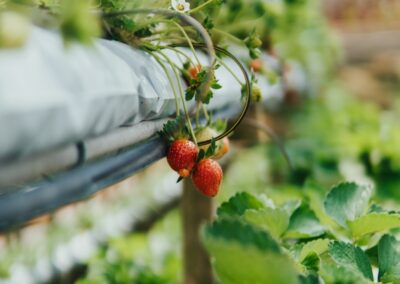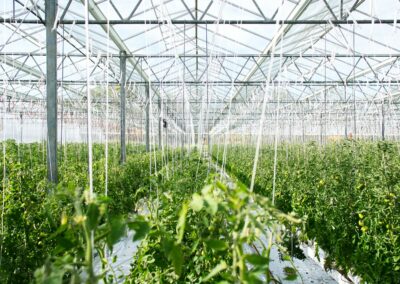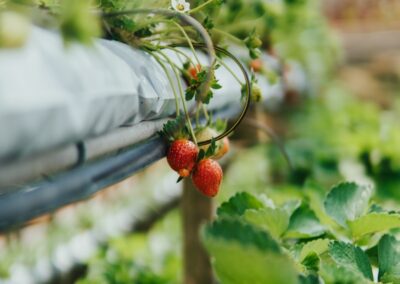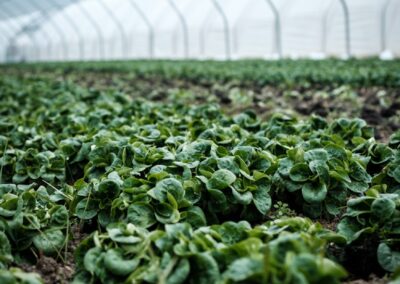The Role of Aquaponics in Climate Resilience
Controlled Environments for Food Production
Aquaponics, a revolutionary approach to sustainable agriculture, integrates aquaculture (raising fish) with hydroponics (growing plants without soil) to create a symbiotic environment. One of the most significant advantages of aquaponics is its ability to operate in controlled environments. This control over environmental factors such as temperature, humidity, and light ensures that both plants and fish are protected from extreme weather conditions and climate variability. For regions like Saudi Arabia, the UAE, Riyadh, and Dubai, where harsh climates can pose severe challenges to traditional farming, aquaponics offers a resilient solution for consistent and reliable food production.
Minimizing Environmental Impact
Aquaponics not only supports climate resilience but also minimizes environmental impact by reducing the need for chemical fertilizers and pesticides. In a closed-loop system, fish waste provides essential nutrients for plant growth, while plants naturally filter and clean the water for fish. This sustainable method reduces water consumption and prevents nutrient runoff, which can contaminate local waterways. For business leaders and entrepreneurs in the Middle East, adopting aquaponics aligns with global sustainability goals and demonstrates a commitment to innovative agricultural practices that safeguard natural resources.
Enhancing Urban Food Security
Urban areas such as Riyadh and Dubai face unique challenges related to food security due to their rapid growth and limited arable land. Aquaponics can be implemented in urban settings, utilizing spaces such as rooftops, warehouses, and greenhouses to produce fresh, local produce. This proximity to consumers reduces the need for long-distance transportation, decreasing carbon emissions and ensuring that food is fresher and more nutritious. For mid-level managers and executives, investing in urban aquaponics projects can enhance local food security, create new business opportunities, and support sustainable urban development.
Artificial Intelligence and Data Analytics
The integration of Artificial Intelligence (AI) and data analytics in aquaponics systems can significantly enhance efficiency and productivity. AI-driven sensors and monitoring systems provide real-time data on environmental conditions, plant health, and fish well-being. By analyzing this data, AI can make precise adjustments to optimize growth conditions, reduce waste, and improve yields. For management consultants and business executives, leveraging AI in aquaponics can drive innovation, reduce operational costs, and improve overall system performance, making it a smart investment for sustainable agriculture.
Blockchain for Transparency and Traceability
Blockchain technology offers a powerful tool for ensuring transparency and traceability in aquaponics supply chains. By recording every transaction and process on a decentralized ledger, blockchain ensures that consumers can trace the origin and quality of their food from farm to table. This level of transparency builds trust with consumers and enhances brand reputation. In markets like Saudi Arabia and the UAE, where food safety and quality are paramount, integrating blockchain into aquaponics operations can differentiate businesses and provide a competitive edge.
The Metaverse and Virtual Training
The Metaverse, a virtual reality space, is emerging as a valuable platform for training and collaboration in the field of aquaponics. Virtual reality (VR) simulations can provide immersive training experiences, allowing business executives, mid-level managers, and entrepreneurs to explore best practices, troubleshoot issues, and innovate within a risk-free environment. This approach facilitates continuous learning and skill development, ensuring that teams are well-equipped to manage and scale aquaponics operations effectively. For leaders in the Middle East, adopting VR training can accelerate the adoption of advanced agricultural technologies and drive business success.
Effective Change Management
Implementing aquaponics requires effective change management strategies to ensure successful adoption and integration within existing agricultural frameworks. Business leaders must communicate the benefits of aquaponics clearly, address potential challenges, and engage stakeholders throughout the process. This involves strategic planning, comprehensive training, and ongoing support to foster a culture of innovation and sustainability. In cities like Riyadh and Dubai, mastering change management is essential for leveraging aquaponics to its full potential and achieving long-term success.
Executive Coaching for Leadership Excellence
Strong leadership is crucial for driving the success of aquaponics initiatives. Executive coaching services can help business leaders develop the necessary skills to navigate the complexities of this innovative agricultural method. Coaching focuses on strategic thinking, effective communication, and the ability to inspire and motivate teams. In competitive markets such as Saudi Arabia and the UAE, executive coaching equips leaders with the tools to lead transformative projects, foster innovation, and achieve sustainable business growth.
#Aquaponics #ClimateResilience #SustainableAgriculture #AI #Blockchain #Metaverse #LeadershipSkills #ManagementConsulting #EffectiveCommunication #BusinessSuccess #SaudiArabia #UAE #Riyadh #Dubai #ChangeManagement #ExecutiveCoaching























